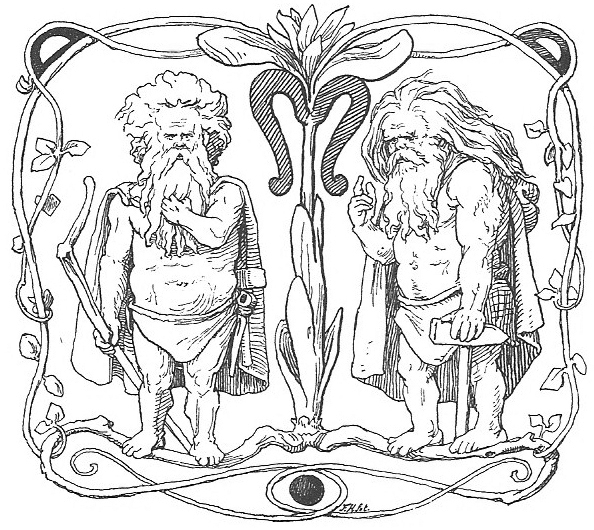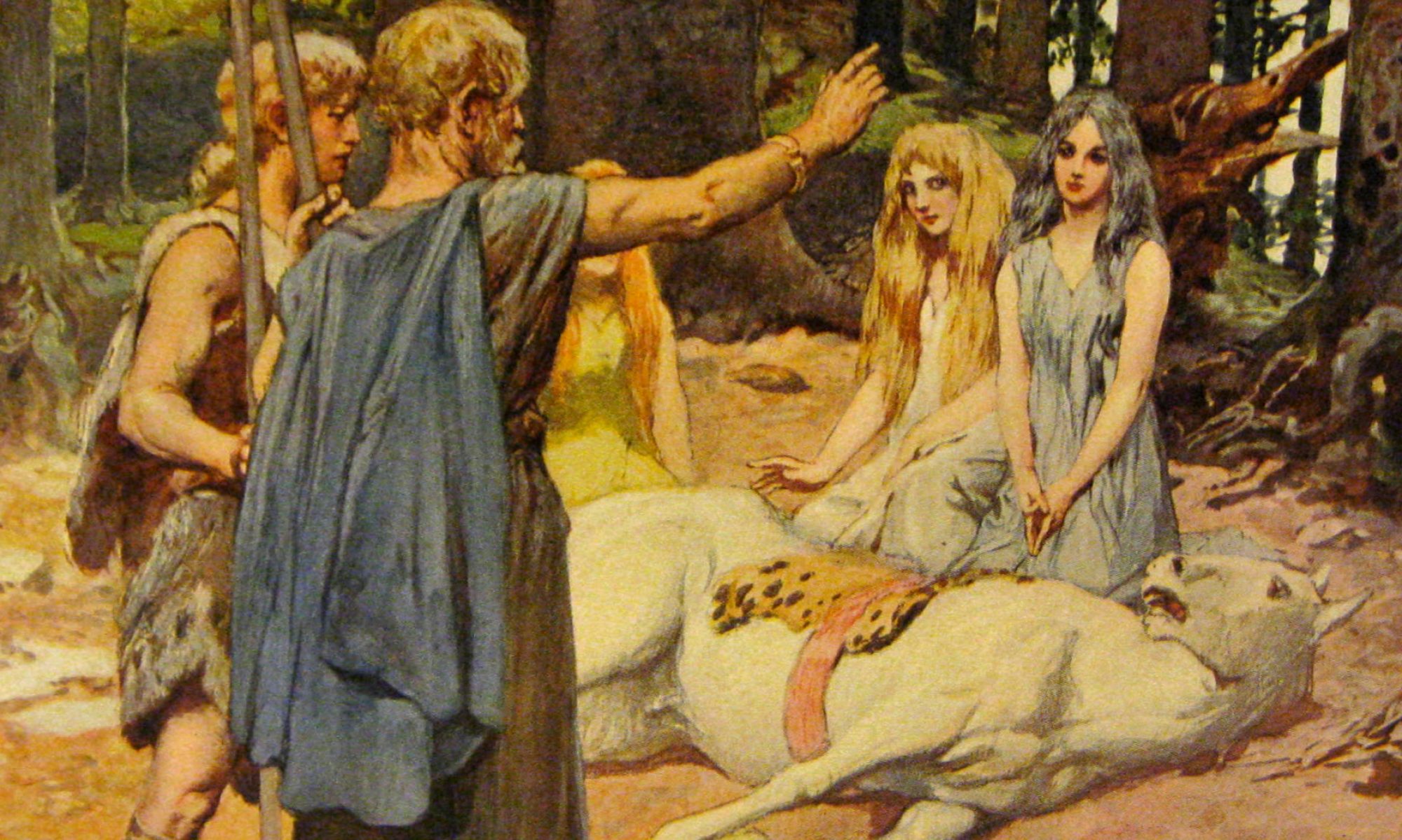11.

By Lorenz Frølich – Published in Gjellerup, Karl (1895). Den ældre Eddas Gudesange. Photographed from a 2001 reprint by bloodofox (talk · contribs)., Public Domain, Link
Nýi, Niði, / Norðri, Suðri,
Nýi, Nidi, / Nordri, Sudri,
- Nýi The one connected with the new moon. Cp. ný, ‘the new moon.’ Nýi could be from nýr, ‘new,’ but the context (Vsp. 11-1) indicates that it refers to a phenomenon of nature.
- Niði The one associated with the dark of the moon. Cp. nið, ‘the dark of the moon.’ So far as the form is concerned it might be from niðr, ‘son, kinsman, relative,’ but the context in which it stands (Vsp. 11-1) supports the view that niði indicates a phenomenon of nature.
- Norðri The one in the North. Cp. norYr,’north.’
- Suðri The one in the South. Cp. suðr, ‘south.’
Austri, Vestri, / Alþjófr, Dvalinn,
Austri, Vestri, / Althjófr, Dvalinn,
- Austri The one in the East. Cp. austr, ‘east.’ — noun sg dat austr the east (sól í austri; til austrs);
- Vestri The one in the West. Cp. vestr,’west.’ — noun sg dat vestr the west (frá vestri ok til norðrs) ; sá ek fugl fljúga ór vestri, from the west;
- Alþjófr Wholly a thief. Cp. alauþn, ‘Complete destruction,’algildi, ‘complete recompense,’ alheilsa, ‘complete health,’ i.e., al- ‘all,’ þjófr, ‘thief.’
- Dvalinn Torpid. Cp. MnN dvalen, ‘lazy, sleepy,’ dvale, ‘stupor, state of hibernation,’ in ablaut with dúra. Gering(13) objects to this connection and attributes the word to dvelja, ‘to delay,’ but the origins of both dvale and dvelja are identical.
Nár ok Náinn, / Nípingr, Dáinn,
Nár and Náinn, / Nípingr, Dáinn,
- Nár Corpse. Cp. nár, m (genitive nás) corpse; a dead person
- Náinn (1) Corpselike. Cp. nár, ‘corpse.’ (2)Relative. Cp. náinn, Náinn m (genitive Náins) (Norse mythology) name of a dwarf, ná (“near”) or nár (“corpse”), thus meaning either “Nigh One” or “Corpselike One”
- Nípingr Pinch. Cp. MnI nípingur, ‘a pinch on the nose,’ MnN nypa, ‘to pinch.’ The word probably came in with the nípuleikur, a game known in other Scandinavian countries.
- Dáinn Deadlike. Cp. deyja, ‘to die.’
Bifurr, Böfurr, / Bömburr, Nori,
Bifurr, Bafurr, / Bomburr, Nori,
- Bifurr Beaver, i.e. one who does things with zeal. Cp. MnN bøver,S bäver, D bœver, MnI bifurr. Borrowed from Frisian-LG bever. The native form of the word was bjórr. The name of this animal is often used figuratively for diligence. Cp. MnN bjor, ‘beaver, hard worker,’ E ‘to work like a beaver.’ MnI has gone even farther; bifurr, ‘beaver, mood, thought, inclination.’
- Böfurr Bǫfurr m (genitive Bǫfurs) (Norse mythology) name of a dwarf, A possible explanation is that this word is an imitation of Bifurr, another dwarf-name.
- Bömburr =Bumburr The swollen one. Cp. bumba, ‘drum,’ MnN bumba, pregnant female with swollen figure
- Nori Little shaver. Cp. MnI nóri, ‘a small bit of something, a little shaver.’
Ánn ok Ánarr, / Óinn, Mjöðvitnir.
Ánn and Ánarr, / Óinn, Mjodvitnir.
- Ánn Ónn This form is listed hesitantly instead of qnn by FJ but is not sufficiently documented. Ǫnn, (1) ? Cp. *AþawiniR, Aþa-, of undetermined meaning, *winiR-vinr, ‘friend.’ Ann (An) and Ǫnn may be variants of the same word. This is not a suitable dwarf-name, since it is a compound which is no longer transparent, an old heroic name. (2) An (undefined) part of a sword. Cp. ǫnn, idem. This is the least objectionable explanation. (3) Hard work. Cp. Qnn, idem, Gothic asans, ‘summer (harvest- time).’ (2) and (3) do not account for Ánn.
- Ánarr =Ónarr Starer. Cp. MnN ona, ‘to stare longingly at something.’
- Óinn Shy. Cp. óask,’tobeafraid,’ MnN oast,’to be afraid,’ o e, ‘fear.’
- Mjöðvitnir Meadwolf, i.e. toper. Cp. mjǫðr, ‘mead,’ vitnir, ‘wolf.’
